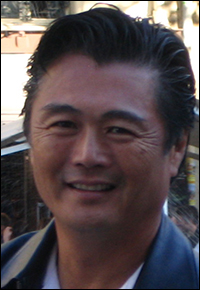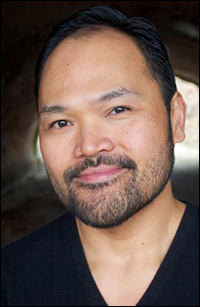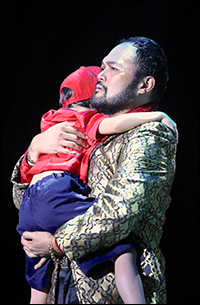
Between 100-200 people gathered to express their objections to the musical's portrayal of the Vietnam War, human trafficking and Asian men and women. The protest included speakers, local politicians, poets and dancers, as well as people chanting, "No more lies/No more pain/Miss Saigon infects your brain."
Prior to opening night, protestors had reached out to various community leaders and encouraged the media to not report on the show during its run. Three forums, organized by the local Asian-American theatre company Mu Performing Arts, had been held to discuss the show's themes and messages. The protestors had requested that the Ordway apologize, offer refunds to ticket holders who desired them and promise never to mount Miss Saigon again. The theatre declined these demands.
This production marks the third time the Ordway has presented Miss Saigon. The previous two productions were also met with protests.
"The Ordway Theater purports to be an organization which promotes diversity and multiculturalism, but it's very clear they have not listened at all to the Asian-American community," David Mura, a press representative of the Don't Buy Miss Saigon Coalition, said in an interview with Playbill.com.
"The Ordway's argument was constantly, 'This is a work of art. It's meant to provoke conversation,'" said Mura, a third-generation Japanese American who had protested the first production of Miss Saigon 20 years ago. "Our argument is that Asian Americans have been dealing with racist stereotypes for generations. We don't need the presentation of racist stereotypes to have a discussion about their negative effect on our community." "We appreciate the perspective of those who criticize Miss Saigon and certainly support their right to protest. While there have been some who have objected to the production, we’ve also received many notes of support and thanks for bringing this show to the Twin Cities," Patricia Mitchell, CEO and president of the Ordway, said when reached by e-mail. "Patrons have strongly supported us and have told us they are thankful for the opportunity to see the show and make their own determinations about its merits."
| |
 |
|
| David Mura |
The original Broadway production opened in 1991 and was nominated for 11 Tony Awards, winning three. It ran for ten years, closing in 2001. Numerous touring productions, as well as local theatres, have also presented the show, and a reworked revival is scheduled to play London in 2014. This is not the first time Miss Saigon has faced controversy; the original Broadway production met with objections from Actors Equity to the casting of Jonathan Pryce as a French-Vietnamese character called the Engineer.
The aspects of Miss Saigon that Mura said the coalition objects to include the romanticization of human trafficking and the portrayal of Asian women as being sexually submissive and available. He said the musical, which features an encounter between a 17-year-old Vietnamese girl who is forced into prostitution and her encounter with an adult white male American GI, presents the encounter as a love story and distorts the nature of prostitution and human trafficking.
| |
 |
|
| Orville Mendoza, who plays The Engineer in Ordway's Miss Saigon |
Erin Quill, an Asian-American actress whose stage credits include Avenue Q and And the Earth Moved, examined the controversy in a lengthy blog post, saying, "I mean, if you are going to protest based on the perception that the show in question portrays women in a negative light, you can feel free to do that, but picking just ONE show to protest based on women's issues is…you know, discriminatory. What are you saying? Asian prostitutes in a show are ‘bad', but you have no opinion on Caucasian Prostitutes or Latin Prostitutes or African American Prostitutes?"
Orville Mendoza, who plays the Engineer in the Ordway production of Miss Saigon, also weighed in on the portrayal of sex trafficking in the musical, describing it as a framing device for the plot. "The unfortunate reality is that human trafficking and prostitution exists today. We're portraying it as a statement of fact — that this exists and existed at that time...The way prostitution and sex trafficking is presented is not a glorification of it whatsoever. It's merely a framing device to tell you the specific world that we are dealing with."
Mura also mentioned objections with the musical's portrayal of Asian men in comparison to the white soldiers from the United States, saying, "The white males — yes, they're flawed, but they're all clearly portrayed as morally superior and more sexually attractive than any of the Vietnamese men, which is another in a long line of stereotyping which sees the white occupying colonialized forces as being morally superior and sexually more attractive to the native women than any native men.
| |
 |
|
| Erin Quill |
Quill also commented on the casting in her blog, writing, "Let me tell you something- and this is as straight as I can say it — Asian American Actors can take ANY part they choose. Period. The End. Asian American Actors are under NO obligation to make Asian America 'comfortable' with their personal choices. We do not stand over your shoulder at your job and tell you that you cannot do it, merely because it is our opinion that it should not be done. Asian American Actors can use accents. Asian American Actors can play Pimps, Doctors, Prostitutes, Deli Owners, Thieves, Kings, and whatever else there is out there. We audition and people hire us. And if we can perform, on Broadway, or on a Television show, or in a Feature film, where it is so competitive even to get a a callback — then YOU, Mr. Joe Protestor, are not allowed to rob us of our right to do it to the highest possible level we can. THAT is what Equality means TO US. That our choices are unlimited."
| |
 |
|
| Orville Mendoza, with Daphne Valenta, in Miss Saigon. | ||
| Photo by Bob Compton Photography |
In response to the protestors' request that the Ordway promise never to present the musical again, Mendoza expressed concern for the future of controversial artistic material saying, "That borders on censorship. If we put a blanket and say you can never ever do this show again, I think that would be very damaging — not just for Miss Saigon, but for any future production that might be deemed controversial in any way."
He said he supports the protestors' rights to express their opinions about the show, even if he does not agree with them.
"I want them to have a voice," he said. "I feel like they are my brothers and sisters. Being an Asian actor/artist myself, I know how important freedom of speech is, and that freedom, I think, works both ways. They are entitled to an opinion of the show. I have a different opinion. And I think my opinion is just as valid." Describing Miss Saigon as "a very specific piece that deals with a very specific time in American and Asian history," Mendoza said the musical "is not representative of all Asians by any stretch of the imagination, nor is it representative of all Americans." He also addressed the accusations of racism, saying, "There are racist statements in the show, but they are purposeful and they are mindful of their time. And if we were to whitewash any of that, I think it would do a disservice to the Asian and American servicemen who lived through the war. I think we have a duty to them as well."
Despite the musical's historical context, Mendoza said he does not think the production of Miss Saigon is making a historical or political statement. He stressed the responsibility to honor and be accurate to the Vietnam War and society surrounding Vietnam, but he said the show is not meant to be a history lesson.
With a revival of Miss Saigon scheduled to open in London in 2014 and a possible opening on Broadway following, Mura said the Don't Buy Miss Saigon Coalition plans to continue protesting the production. The website dontbuymiss-saigon.com, which was built in September, features a Tumblr account where people are invited to express their thoughts on the truth of the musical.
"It's going to be a continuing national campaign against Miss Saigon," Mura said, mentioning an online petition that has 946 signatures on the website 18 Million Rising - Activating Asian America. "I think we have the tools to take this to a national level."
Performances continue through Oct. 13.
View photos from the production:



















































